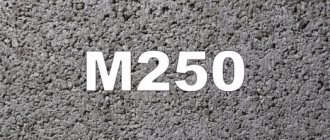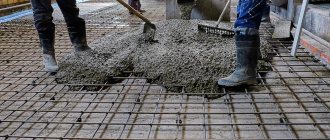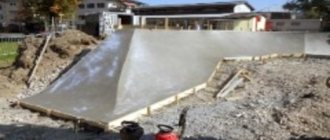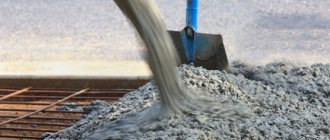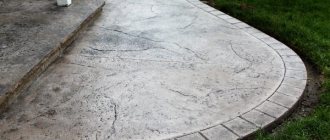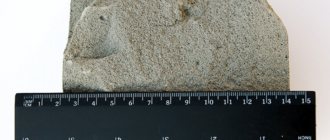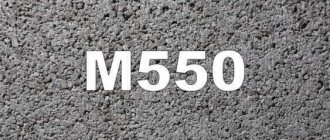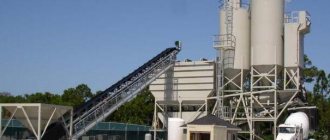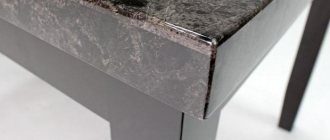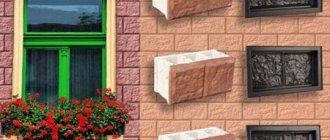Full description
Concrete mortar marked M100 belongs to the lean type mixtures. This indicates a low cement content in the material. It belongs to class B7.5. To prepare the mixture, a binder, water and various fillers are used. This type of concrete is considered the simplest and most cost-effective. Concrete M100 is offered in Domodedovo and other cities of the Moscow region.
One of the main advantages of this type of mixture is its affordable cost, which can significantly reduce estimated costs.
Scope of application
Not the best technical characteristics and operational features limit the use of this brand of concrete mixture. It is advisable to buy M100 concrete if the goal is to reduce estimated costs when carrying out low-responsibility construction work. It is often used:
- Creation of the basis for the road surface and sidewalks;
- Preparing the site to create reliable foundations;
- Preparation of a solid foundation for the installation of reinforced concrete blocks;
- Installation of floors in basement-type premises;
- Construction of a rough foundation for non-residential premises.
You can always order M100 concrete with delivery at a competitive price!
Characteristics. M100
| Concrete class according to GOST | BST V7.5 P4 F50 W2 |
| Density depends on the type of filler used. It can range from 2.36 to 2.5 t/m3. |
| Low strength. For concrete of this grade, the average permissible load is 0.098 t/cm2 of area. |
| Mobility. The solution is characterized by elasticity, it is easily compacted, as indicated by the special marking (P2-P4). |
| Frost resistance. The concrete mass can withstand from 50 to 100 freezing/thawing cycles without cracking (marking F50-F100). |
| Hardness (G2-G4). The material is easy to work with, as it holds its shape when poured. |
Files
zvezda_kachestva.pdf
File size: 104.51 KB
We work with all customers.
We work with both individuals and legal entities.
All concrete strictly according to GOST
Strict adherence to recipes. Our products meet all GOST and SNiP requirements.
Own fleet of equipment - 18 units.
Availability of modern transportation equipment.
Flexible system of volume discounts (up to 200 rub/m3)
Depending on the volume of purchased products, our customers have a system of discounts.
We work around the clock, seven days a week.
Shipment is carried out around the clock, 24 hours, 7 days a week.
Certificates and licenses
Certificate of conformity
Appendix to the certificate of conformity
Certificate of conformity
Ready-mixed concrete grade M400 (B30)
Concrete is a unique building material that consists of at least four elements: water, sand, gravel/granite and cement powder. To give it certain characteristics, plasticizers and other additional components are added to the mixture to enhance one or another property of the product. This step increases the cost of the final product, but if we talk about the traditional recipe, concrete today enjoys well-deserved popularity due to many positive qualities. Such as: fluidity of shape, strength after hardening, the ability to use in any climatic conditions, reasonable cost, etc.
Of course, concrete is different from concrete; each brand has its own pros and cons. Therefore, before you buy ready-mixed concrete, it is worth finding out for what work it is advisable to use a particular class of mortar. Until relatively recently, the requirements for the construction of large projects were less stringent, so the M400 brand was not popular. But literally in 10 years, the rules and regulations have changed, and the demand for elite concrete has increased sharply.
In what cases is it advisable to use a B30 class solution? Builders turn to the Beton-M concrete plant, which is located in Zelenograd, when they need a high grade for:
- Construction of powerful industrial buildings and structures. For the construction of low-rise buildings, this concrete is practically not used due to the fact that for the implementation of a private house project it is quite enough to use grades M350 and even M300.
- Work under urgent construction conditions. The fact is that a solution with a large amount of cement quickly sets and hardens, and this property provides its advantages when implementing special projects.
- Manufacturing of reinforced concrete products for various purposes. Columns, piles, slabs, etc., made from M400 concrete, are reliable and durable. Due to this, they are also used in the construction of large industrial facilities and in the construction of “heavy” administrative and residential high-rise buildings.
The production of class B30 concrete must strictly meet the standards and requirements accepted in construction, therefore we use only high-quality materials:
- The cement for M400 is “GOST”, PTs 500, with fine grains.
- The sand added to the solution corresponds to the first class, the characteristics are not lower than GOST 8736-93. This allows the concrete structure to be compacted as completely as possible.
- Crushed stone is also “GOST”, the strength scale of the material is about 1200 units. The size of the fractions is from 5 to 20 mm, since stones that are too small will not provide the desired strength, and stones that are too large will change the characteristics of the building material.
- Water is added according to the recipe, and it has a neutral acidity level and does not contain large suspended solids.
- The plasticizer is also added according to the documents for the production of class B30 solution.
- Other elements that are introduced at the request of the customer. When making changes to the recipe, customers should remember that the price of the finished product in this case will be higher, so it may be more advisable to purchase concrete of the M450 and M500 grades if the characteristics of M400 are somehow not satisfactory.
Let us remind you that our company also provides such a service as delivery of concrete and mortar to the work site. By purchasing a solution from our factory and ordering its delivery, you save time and money, since the mixing-shipping-delivery-filling process takes place in the shortest possible time. At the same time, disruption of construction work is excluded: a third party may refuse to work with you at any time, and searching for a new cargo carrier will take time. We are always there. And it’s convenient with us!
.
M150
Class according to GOST: BST V12.5 P4 F50 W2 Concrete mixture grade M150 can be safely called one of the most popular materials in construction. It is especially popular among private developers, since it almost completely covers their needs - from laying out the foundation to creating partitions, walls and other structures. Price: 3300 ₽
Production of ready-mixed concrete
The production of ready-mixed concrete at our plants is controlled by competent technologists at all stages. This ensures the production and sale of exceptionally high-quality material that meets the requirements of state standards, as well as building codes and regulations. If you want to buy ready-mixed concrete cheaply with delivery in Moscow and the Moscow region, then our organization will deliver the products exactly on time. This material has a number of advantages:
- The cost of ready-mix concrete with delivery is almost the same as the price of products made by handicraft method;
- Each stage of ready-mixed concrete production is tested by an accredited laboratory directly at the plant;
- During the production process, the technology is strictly followed (the humidity of the components is controlled, the exact mass of each part is determined, the correct temperature in the working area is ensured, and so on);
- You can buy ready-mixed concrete from the manufacturer quickly and profitably.
M200
Class according to GOST: BST V15 P4 F100 W4 Concrete marked M200 is widely used in construction. This is due to its high technical characteristics, which allow the building material to be used to solve a wide range of problems. Among the advantages of the mixture of this marking, it is worth noting the ideal combination of price and quality. Price: 3400 ₽
CONCRETE PRODUCTION NETWORK PTK STROYBETON - QUALITY ABOVE ALL
When choosing and purchasing concrete for various structural structures, the question of labeling invariably arises. On the market for this building material, thanks to the development of production technologies, a wide range of concrete is offered for specific conditions of use, or for universal use.
Informative indicators of concrete properties
The determining criteria for a concrete mixture are the area and conditions of use. Currently, two informative systems of expression are used for this material - brand and class. They notify buyers about the key characteristic - resistance to compression, and also determine frost resistance, resistance to moisture and the influence of high temperatures. The grade and class of concrete are determined at the age of 28 days from the day of pouring concrete components under regulated technological conditions. After this period, 95% of the basic properties are established. Distinctive categories of concrete:
– Brand of concrete. This index is indicated in the marking by the letter “M” and numerical values from 50 to 1000. It is measured in kgf/cm² and shows the average compressive strength of the tested samples of concrete cubes. The maximum permissible deviation in strength is 13.5%. The larger the number indicating the grade, the stronger the concrete. Its production involves homogeneous, high-quality cement. With high-strength concrete, it is necessary to quickly perform pouring operations, since it dries quite quickly. Classification “M” is used when installing monolithic floors and in monolithic construction.
– Concrete class. This index is marked with the letter “B” and the digital values next to it. There are 21 classes of concrete - from 3.5 to 80. This indicator is measured in megapascals (MPa) and indicates the withstand pressure of a compressible cubic sample. The probability of possible destruction of the tested cubes is no more than 5 pieces per 100 samples.
In the design documentation of various construction projects, the class of concrete is indicated, and in orders for the purchase of the mixture, the brand is indicated.
Our company is professionally engaged in the production of various assortments of concrete mixtures. We are the sales leader in Moscow and the Moscow region. The development of recipes is carried out at modernized testing grounds and workshops. This made it possible to optimize production processes and set cost-effective price parameters. The website table shows the ratio of concrete produced by brand and class. Orders are delivered directly to the construction site.
Question answer
Concrete is classified depending on the area of application, because a certain type of work has its own requirements and conditions for the material.
By purpose
Structural - a standard type of concrete that does not have any specific characteristics. Special - concrete to which certain requirements are applied in accordance with their purpose.
By type of binder
Cement - created on the basis of cement compositions. It is considered the most common type of concrete used. Lime (silicate) - such concrete is made on the basis of lime using an autoclave hardening method. At the moment, this type of concrete is used less frequently than others. Slag concrete - such concrete is produced from mixed ground slag with alkaline solutions. Gypsum - this type of concrete is used for finishing buildings, for example, in the construction of suspended ceilings and internal partitions of walls. Special - produced on the basis of special binders, depending on the environment in which the mixture will be used.
By structure
Dense - the entire space between the filler granules is occupied by hardened binders and the pores of air trapped in them. Porous - the space between the aggregate granules is filled with hardened binders and porous foaming and gas-forming agents. Large-porous - concrete in which the space between the grains of coarse aggregate is not completely filled with small aggregates and hardened binders. Cellular - with this structure, concrete consists of a hardened binder and a siliceous component, in which the pores have a clearly structured structure.
By type of fillers
Dense - consist of large, heavy natural or artificial materials, such as graphite and crushed stone. Porous - consist of light, natural or artificial bulk materials, such as sand. Special - have special characteristics that meet the requirements for specific application conditions.
According to hardening conditions
Natural - under such conditions, hardening occurs without the use of additional processing through the interaction of the material with the air environment. Conditions for heat and moisture treatment - to speed up the hardening process, steaming, contact heating and other methods are used. — at atmospheric pressure — at pressure above atmospheric
Factory-mixed concrete and its composition
BSG (ready-to-use concrete mix) is ready-mix concrete. Separate BSM and BSC - fine and coarse-grained solutions (M200). They are mixed at the factory and delivered in moving form to the pouring site. Factory vehicle fleets are equipped with concrete mixers with special equipment, which allows ready-mixed mixtures to be delivered to different types of terrain, covering long distances. The composition includes simple components: cement, water, sand, crushed stone. However, they undergo careful selection, purification and performance monitoring. The recipe for each mass is unique and depends on the properties that should be obtained in the final result.
Technical brands
The production of ready-mixed concrete uses officially accepted markings to indicate its characteristics, presented in the table:
| Marking | Decoding | What does it mean | |
| M50—1000 | Strength | 1 square centimeter of concreting area will not withstand a load greater than that indicated by the marking (in kg) | |
| The most applicable are M200-400 | |||
| B3—40 | Compression class | Pressure in megapascals that a concrete mass can withstand | |
| F25—1000 | Frost resistance | Shows how many times freezing and freezing of a structure is possible without compromising the properties of artificial stone | |
| Zh6—37 | Rigidity | Characterizes workability | |
| W2—20 | Waterproof | Increases with brand growth | |
| P | 1—2 | Mobility (the type of delivery transport depends on the indicator) | Dry concrete corresponds to 1-2 degrees of mobility and is transported by dump truck |
| 3—4 | Concrete pump is used for monolithic structures | ||
| 5—6 | Made with plasticizers, moved in a rotating concrete mixer | ||
Types and characteristics
To obtain heavy concrete, natural or mountain fillers are used, which ensures high density.
Based on strength, density, type and structure of aggregates, ready-mixed concrete is classified into light, heavy, and with special applications. In the construction of ordinary houses and industrial buildings, mixtures with crushed stone with a density of 1900-2500 kg/m3 (M250-300) are used. Fillers include diabase, limestone, and gravel. Fillers for heavy concrete (M400-500) include iron ore, barite, and steel shavings. This ensures a density above 2500 kg/m3.
The type of concrete is determined by the density of its filler.
Granite, as the most durable aggregate with good water and frost resistance, is poured into solutions for laying road surfaces. Light type (M100-200) includes porous materials. When producing cellular blocks, expansion technology is used. Aluminum powder and foaming additives are added to the mixture to form foam or aerated concrete. To lighten the freight train, tuff, pumice, expanded clay, and beaten slag are used.
